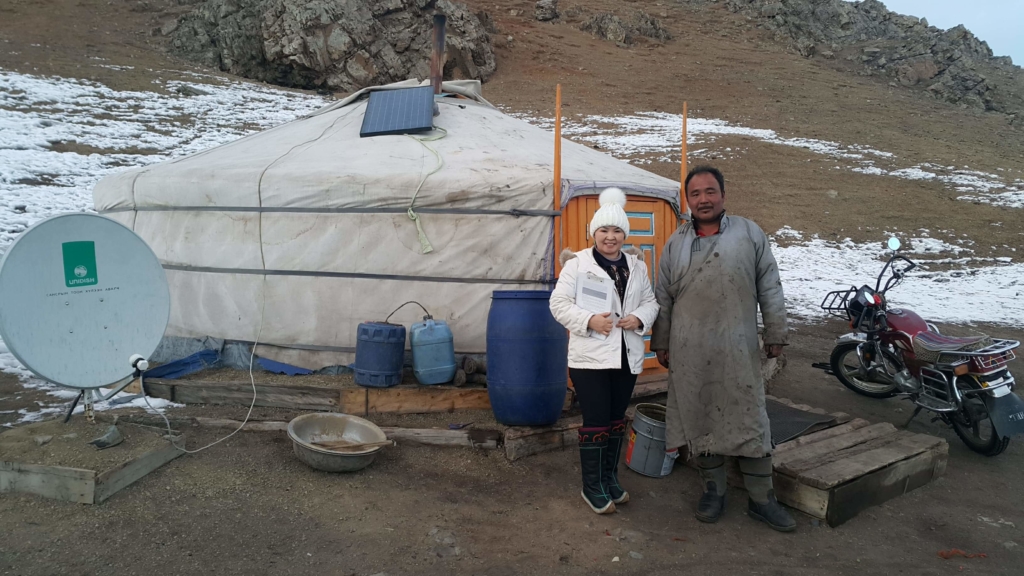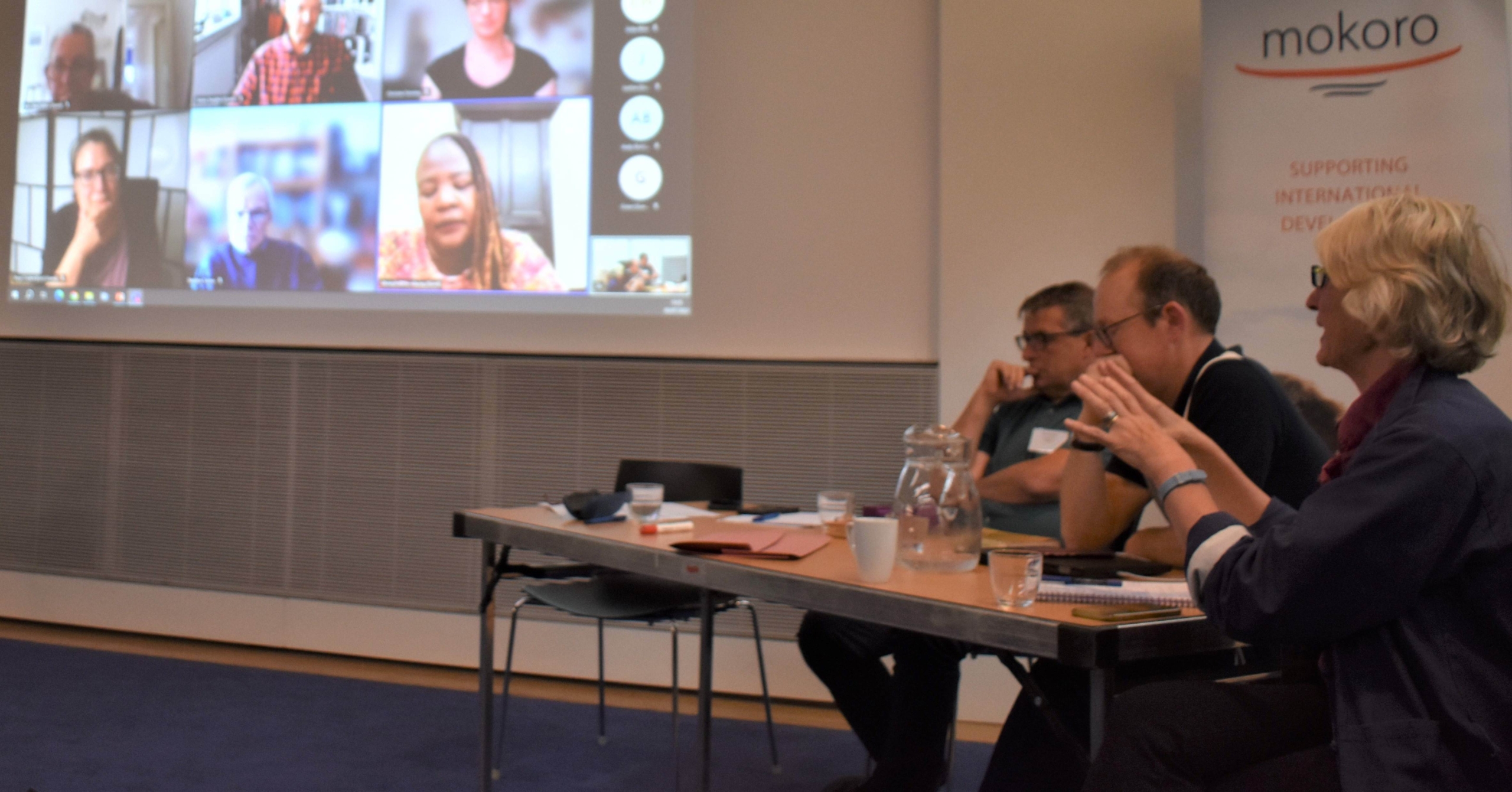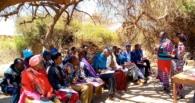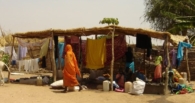Mongolian herder families are being split between countryside and town
B. Munkhtuvshin
30 April 2019
/
- 0 Comments
B. Munkhtuvshin is a researcher with Mongolian NGO People Centered Conservation (PCC). PCC is partnering with Mokoro in a 4-year participatory research programme on Women’s Land Tenure Security (WOLTS) in pastoral communities.
One snowy winter’s day I went to a small winter camp of just two households 140 km from the nearest soum (district) centre. A dog stopped me getting out of the car for some time but eventually a man came to hold it back, explaining that the man from the neighbouring household was away on Otor migration in the mountains with his cattle. The two men were brothers, and the one left behind, Batbold, was taking care of their smaller livestock. It was very cold in his ger and I had the impression that he had not made a fire all day. I introduced myself, asked if I could talk to him, and pulled out my notebook. It was so cold that I had to ask him to make a fire to start the conversation.
Batbold told me he was 26 years old and had four children aged between six years and six months. His oldest son started 1st grade this year. He and his wife managed to put up a ger in the aimag (regional) centre on someone else’s plot where she and the children could stay for the school year. Meanwhile Batbold returned to their winter camp to look after their livestock. His wife and children came home during school holidays, but it was a difficult 200 km journey from the aimag centre on rough roads, over many hills and mountain passes.
As I drove away, I thought about the years ahead for this herder and his wife, separated while their children went to school and he herded livestock with his brother’s dog for company, only cooking occasionally and going to sleep in a cold ger.
Another day I visited another camp of two young herders also separated from their wives and children. One was herding goats and sheep while the other had larger animals, yaks. At least, I thought, compared to Batbold, they have each other for company. However, while I was with one of these young herder, I noticed his ger was also very cold. Next to the stove there was a big uncovered pot of frozen soup. He told me he made soup in one big batch and allowed it to freeze and then took some every day to warm up and drink before going to bed. “I have to eat a warm meal to get under my cold blanket, otherwise it is hard to sleep in this ger,” he told me. “But it takes a long time to cook in the evening after coming in from herding all day. So I just cook a big meal every so often and make it last.” The two men’s children were in the 2nd and 3rd grades of primary school and each had two younger siblings.
Later, back in the aimag centre, I met a woman herder, Bolormaa, who lived on a plot with two other mothers who were all looking after their young children. Bolormaa sent her 2nd grader to school and looked after her one-year-old at home. She told me that her husband lived in their winter camp most of the time but sometimes left his livestock with neighbours to bring meat to his family. Bolormaa earned some income in the autumn by selling the family’s livestock but this was her only source of funds. Living in a split family, as they did, doubled their household costs and it was often hard to make ends meet. Her home was also far from the school, and on very cold days when she could not take her one-year-old outside, she had to let her 2nd grader walk to school alone. She felt this would be quite safe at their winter camp in the rural area, but in the aimag centre she worried all day until her child came home. Also, lately her husband had not been visiting as often as he used to.
Then there was a widow I met, living with her three children. Three years ago she gave her livestock to relatives to look after, and moved to the soum centre to send her children to school. The size of her herd had decreased since she left the countryside and she could no longer continue to support her family and was now unemployed. “Since my husband passed away I was not able to herd my livestock properly.” She explained she could no longer take the livestock on Otor, so their numbers decreased. “Now I have moved to the soum centre to look after my children, I can no longer be a herder.”
I realised she and other single parent herders faced very difficult choices – either to leave herding to look after their children or not to send their children to school at all, which is against the law.
Over three years carrying out WOLTS research in different parts of Mongolia, I have met many young herders. Some young men joke that when women go to live in the soum and aimag centres, their skirts shorten, they change their hairstyles and they become more outspoken. Though it is a joke, we say in Mongolia that 80% of a joke is reality.
There are also many senior citizens who look after their grandchildren in the aimag or soum centres of Mongolia. Young couples whose parents are still alive are considered the luckiest. But six–year-olds living with their grandparents miss their parents and may not focus on their studies. The grandparents I met told me that they tried to arrange visits for the children to see their parents every week.
Solutions need to be found if rural households are going to be able to preserve family life and herding traditions while also educating their children. Perhaps the answer is distance learning via TV, or mobile teachers to visit herder households in rural areas to help parents school their children themselves. In soum centres, extended childcare facilities would provide relief for single parents, grandparents and others trying to manage childcare while also making a living.
Mongolia’s herding culture is under immense pressure from many directions, and if families are not supported this ancient and unique system of land and livestock management could be lost more quickly than we realise.
For more information on WOLTS, including access to research reports and publications, visit https://mokoro.co.uk/project/womens-land-tenure-security-project-wolts/.

You must be logged in to post a comment.



